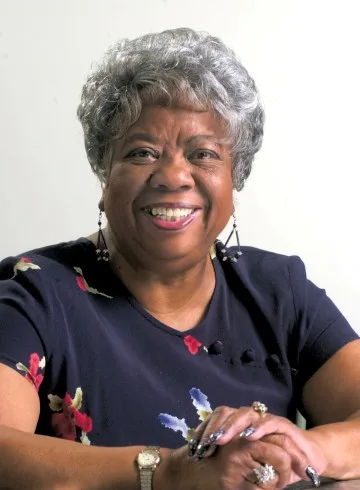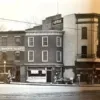By Genoa Barrow | OBSERVER Senior Staff Writer

She was the first Black woman on the Sacramento City Council and while she had just one term in office, her legacy of service was solidified by decades of commitment throughout the community.
Callie Carney passed away Nov. 4 after living with Alzheimer’s for several years. She was 88. Carney served on the City Council for District 5 from 1975-1977, having been appointed after Phil Isenberg became mayor. She earned her wings just a week after Isenberg’s death Oct. 26.
Originally from Anniston, Alabama, Carney was born July 12, 1935. At age 13, she moved with her family when her stepfather was transferred from Alabama’s Brookley Air Force Base to McClellan Air Force Base in Sacramento. The family initially settled in Del Paso Heights, where she attended Grant High School before transferring to Sacramento High School.
Carney moved to Oak Park in the 1950s. It was there that her life of action and service would take shape. She met James Leo Carney and they married Feb. 17, 1951. The couple had 10 children.
“She’s always had an intense desire to be helpful,” said Carolyn Carney-Clark, the eldest.
“She was always the ‘go-to’ person in the community. Regardless of what kind of problem it was or what happened, everybody kind of migrated to mom. She would be the community counselor, I guess you might say,” Carney-Clark continued.
“She always had an open-door policy,” added daughter Mary Nance Harris. “Her legacy was, ‘If I can help somebody along the way, that’s what I’m going to do.’ That carried over from politics to her personal life to her social life to whatever.”
Carney’s résumé included stints working for the U.S. Department of Housing and Urban Development, securing subsidized housing for local low income families. She was an adviser to California Gov. Jerry Brown during his first term. Earlier, she advocated on behalf of low-income people as the chairperson of a nonprofit operating during John F. Kennedy’s presidential administration. At one point, President Kennedy’s sister, Eunice Kennedy-Shriver, visited Carney’s home with her daughter Maria, the future first lady of California, and they had tea.
“They worked on some committees together,” Carney-Clark said. “One of them was to secure funding for training programs to promote economic development in an area encompassing 14 states to combat the adverse effects of poverty.”
It wasn’t just something she did because it was a job. Carney often opened her own home to feed the hungry and shelter the unhoused.
In the community, Carney served as executive director of the Women’s Civic Improvement Club from 1981-1996, was a charter member of the Sacramento Valley Section of the National Council of Negro Women and was involved with the United Way, the Greater Sacramento Urban League, Black American Political Association of California, the Sacramento NAACP, Birthing Project USA, the California Homemakers Association, and the Oak Park Neighborhood Council.
As if she didn’t already have enough on her plate, Carney made sure to show up for her own children’s activities. She joined the PTA and was the first Black female Cub Scout leader at Bret Harte Elementary School. She was also known for sitting in her children’s classes to make sure they acted right. And she was an additional mother to the “street kids” she’d snatch up and make fly right. The disciplinarian in her extended to her other endeavors as well.
“Her commitment to her community was outstanding,” Nance Harris said. “She used to ride with the police back in the day with the Muslims, the Panthers and the Black Souls. She rode with the police to make sure they didn’t kill our kids.”
Carney was described by fellow leaders and members of the community as a force to be reckoned with – outspoken, stubborn and unapologetically focused on securing better for those around her.
“She always said that when she was appointed, she went into the City Council with a purpose and that was to make sure that her district received equitable, fair treatment as far as funding, educational opportunities, job opportunities, training opportunities,” Nance said. “Just the general life quality of the residents in her district. That was her main goal. If Oak Park wasn’t getting any, nobody was getting any.”
The stage at McClatchy Park was rededicated as the Callie Carney Amphitheater in 2012. The OBSERVER recognized her as a community legend in 2003. Carney’s work and legacy are chronicled in print as she is featured in the book “Black Women Makers of History” that was used in the curriculum for California universities. Late university educator and community champion, Dr. David Covin also mentioned her in his book, “Black Politics After the Civil Rights Movement: Activity AND Beliefs in Sacramento 1970-2000.”
“She was an eloquent and persuasive speaker who had legitimate credentials as a militant,” Dr. Covin wrote. “She could fire people to rage or move them to tears.”
Carney was diagnosed with Alzheimer’s in 2009. She maintained her independence and lived in her own apartment until summer 2018. She still liked to keep abreast of what was going on in Oak Park, whether it was crime, gentrification or efforts to preserve the history of African Americans and their contributions to the area.
Carney still wore high heels and enjoyed getting her signature long nails done.
“Even in the middle of Alzheimer’s, she was still gonna be her,” Nance said.
Carney was preceded in death by her parents Rosabelle and Richard Kennedy; husband James Leo Carney Sr.; sister Willamae Lash; brother-in-law Frank Lash; sister Eunita Culpepper Williams; brothers Anderson Culpepper and Peter Culpepper; her children James Carney Jr., Joseph Carney, Richard Carney, David Carney Sr. and Kimberly Carney; and grandchildren David Carney Jr. and Suelynn Carney.
She leaves to cherish her memory sisters Patricia and Lydia Culpepper, and brother-in-law Henry Williams; three daughters, Carolyn Carney-Clark, Mary Nance Harris (Richard), and Shirelle Jeffery (Randolph); 13 grandchildren; 17 great-grandchildren; a great-great grandchild; and a host of nieces, nephews, cousins, friends and associates.
A viewing has been set for 4-7 p.m. Monday, Nov. 27, at Morgan Jones Funeral Home, located at 4200 Broadway. A funeral service is at 11 a.m. Tuesday, Nov. 28, at Shiloh Baptist Church, located at 3565 9th Ave.





